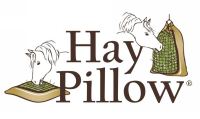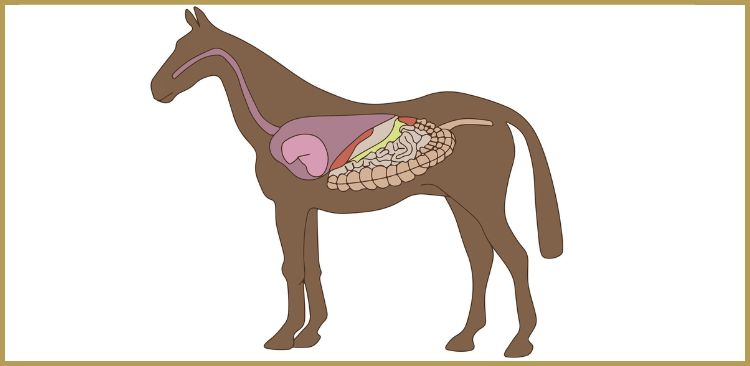Equine Gut Health - The Need for Feed
Read on to learn why gut health is so important, how common feeding practices affect it, and how to improve it by feeding more in line with your horse's digestive tract design.

Why is Gut Health Important?
- Contribute to stimulation of the immune response
- Help protect against pathogens
- Neutralize toxins
Horses require a well-balanced population of microbes in their digestive tract to enhance digestion and absorb nutrients (not necessarily calories). Some of these microorganisms are essential for manufacturing necessary nutrients as well.
Factors that can disrupt healthy populations of equine microorganisms include:
- Feeding a new load of hay
- Changes in forage type
- Changes in type and amount of grain fed
- Decreased access to pasture
- Age
- Fasting
- Stress
- Medications
- Anesthesia
How Rate of Consumption & Meal Size Affect Gut Health
Meals that are quickly consumed reduce the optimum time necessary for each distinct region of the digestion tract to properly digest and prepare forage as it advances from ingestion to excretion (Mouth > Stomach > Small Intestine > Large Intestine). Once the stomach becomes two-thirds full it begins to empty regardless of how well the particles are prepared to advance to the small intestine.
Prolonged periods of fasting (between meals or overnight) can create stress and:
- Contribute to an acidic pH environment in the digestive tract
- Induce gastric ulcers
- Influence less than optimum beneficial microorganism populations
It is important to note that the pH environment of the digestive tract directly influences beneficial microorganism populations. Optimum pH levels are best achieved by providing a steady flow of appropriate forage/fiber.
Feeding by Natural Design vs. Domestication
Movement is also important to gut health. Mobility stimulates gut motility, effectively keeping the hindgut weighted (to encourage continued travel of undigested material motile). Muscles responsible for movement of the gut are better toned when utilized and can atrophy.
In nature, the horse's activities consist of traveling to water sources, walking and grazing, interacting with herd mates and periods of rest. They will voluntarily take breaks to sleep and rest for periods of time, typically no longer than an hour.
Domestication, typically, does not mimic nature's design. Common domestic scenarios contributing to less than optimum gut health are:
- Turn out during the day to graze on pasture and confined to stalls at night with a small meal of hay that is quickly consumed.
- Confined in a corral or stall with no pasture and fed breakfast, lunch and dinner in equal amounts - leaving overnight as the most prolonged period of time without forage.
- Kept in a dry lot and fed 2 large meals of hay (breakfast and dinner) typically consumed in 1-3 hours.
According to Martine Hausberger, PhD, director of the Laboratory of Animal and Human Ethology, a branch of the French national research center (CNRS) and the University of Rennes:
”It is also known that horses can experience gastrointestinal discomfort if deprived of food for a mere one to two hours.”
Ways to Improve Gut Health
- If you feed meals, allocate hay across a 24 hour schedule. For example, if you feed 24 pounds of hay a day (24 hours) = 1 pound per hour. Say you feed breakfast at 8:00 AM, lunch at 1:00 PM and dinner at 6:00 PM. Breakfast should be 5 pounds, lunch 5 pounds and dinner 14 pounds - this ensures your horse has enough to nibble on during the 14 hours between dinner and breakfast. Remember, horses sleep only 3 to 4 hours in a 24-hour period and usually no longer than 20 minutes at one time.
- If you feed loose hay, implement slow feeder bags or nets and provide multiple locations. If your horse is overweight, slow feeding will help to regulate insulin spikes, metabolism, and secretion of cortisol. For underweight equines, it can improve digestion, assimilation of calories and nutrients by increasing chew time per pound. See our Free Choice Forage Action Plan for more suggestions.
- Most slow feed manufacturers are willing to offer advice on mesh sizes and the most appropriate slow feed solution for your individual environment and weather conditions. Take advantage of their knowledge and experience.
- Provide as much turnout as possible with access to free choice forage (pasture, loose or slow fed hay). Learn more about choosing the most appropriate free-choice hay: Beyond Low Sugar/Starch - Choosing Hay for Weight Management.
- If access to pasture is limited due to concerns of caloric intake, use a grazing muzzle in pasture and turn out when sugars are likely to be lowest. Provide hay in slow feeders when not in pasture.
In Closing
Striving to trickle feed, encourage movement and allow your horse access to forage 24/7 may seem contrary to meals and confinement, but we can make positive changes and have options to work with.
Helpful How To Resources
- Sand Colic - The Surprising (Simple) Cure & Prevention
- Can Horses Eat More Hay Without Weight Gain? The Surprising Factors
- Are You a Prisoner of Feeding? Here's How I Broke Free
- 6 Great Reasons to Feed Your Horse from Ground Level
- 9 Benefits of Slow Feeding Horses
- 7 Slow Feed Dos and Dont's for Horses
- 7 Easy Ways to Help Prevent Colic
- Causes of Equine Ulcers – 7 Stress Factors & Solutions
- Never Exercise Horses on an Empty Stomach...Ever
- Why You Shouldn't Transport Horses On An Empty Stomach
- Keeping Horses Warm Naturally – Internally and Externally
References:
- Salem, S.E., Maddox, T.W., Berg, A. (2018, May 31) Variation in faecal microbiota in a group of horses managed at pasture over a 12-month period. Retrieved from https://www.nature.com/articles/s41598-018-26930-3
- Thomas, H. S. (2019, July 25) Ten Ways to Optimize Your Horse's Digestive System. Retrieved from https://equusmagazine.com/horse-care/ten-ways-to-optimize-the-equine-digestive-system-8425
- Equine Nutrition/Digestive anatomy and physiology. Retrieved from https://en.wikibooks.org/wiki/Equine_Nutrition/Digestive_anatomy_and_physiology
- Venable, E.B., Bland, S.D., McPherson, L., Francis, J. (2016, July 1). Role of the gut microbiota in equine health and disease. Retrieved from https://academic.oup.com/af/article/6/3/43/4638753
- Team Hygain, (2019, April 30).The Horse’s Digestive System. Retrieved from https://hygain.com.au/horses-digestive-system





